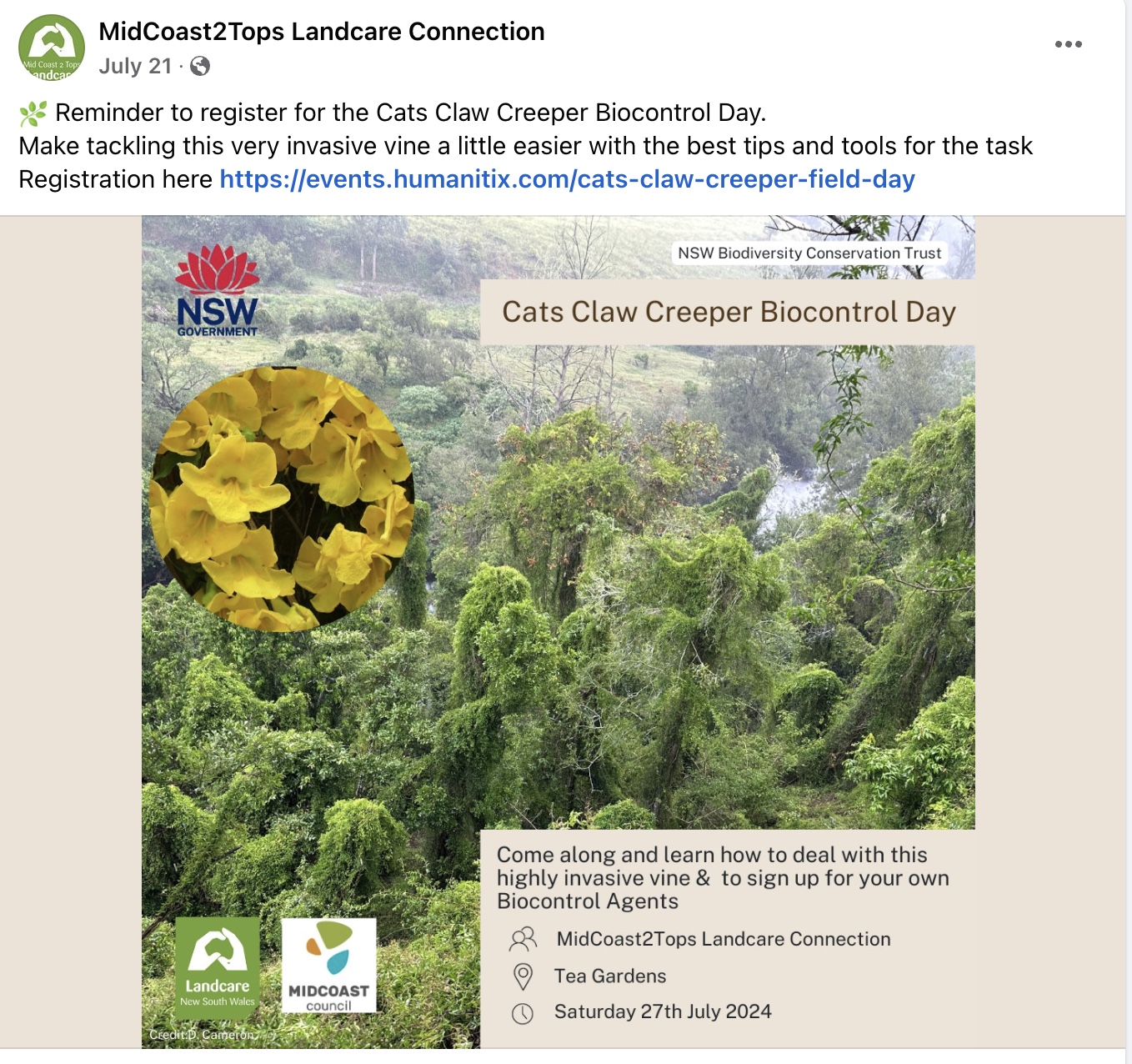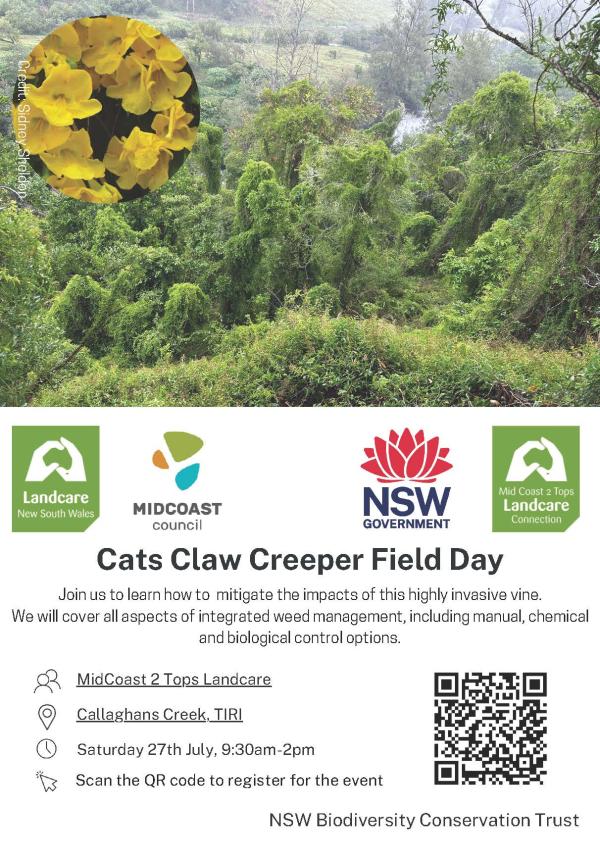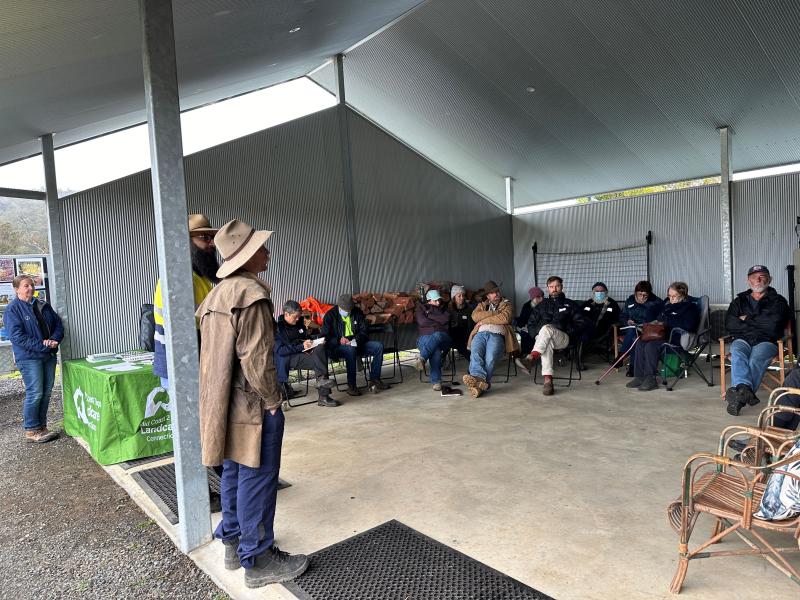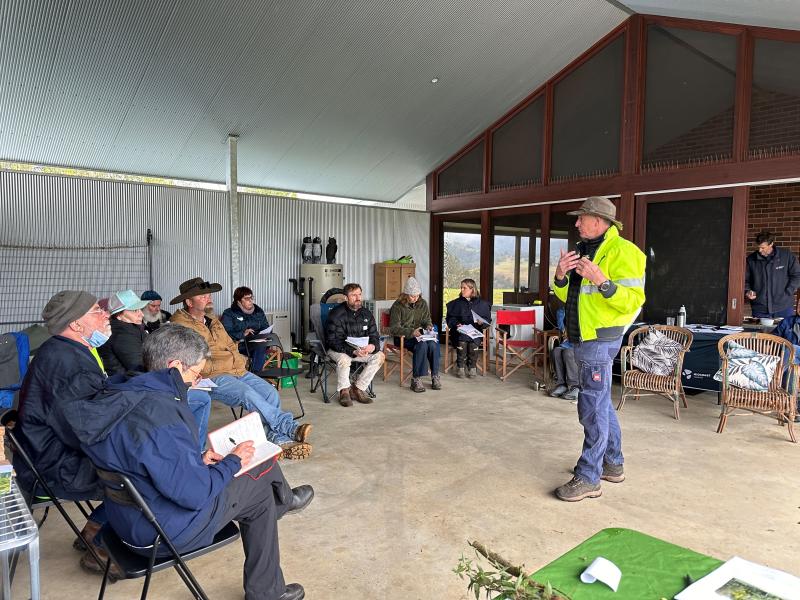Event Type
Landcare Region
BCT Region
#5 Tiri Networking event
Cats Claw Creeper, Dolichandra unguis-cati is a vigorous woody vine with showy yellow flowers that smothers host trees. It is difficult to control, particularly along steep river banks, and is impacting our native riparian vegetation along the banks of the Upper Manning River, where it has rapidly spread in recent years.
This field day will give practical advice about how to approach this problematic weed, with a range of experts providing information and demonstrations of integrated weed management strategies, including how to prioritise your efforts. Methodologies such as hand control methods, chemical control and biological control agents will be discussed and demonstrated.
Chris Scott (Sustainable Natural Resources Group) will give a walk-and-talk along the banks of the Manning River, with an overview of the weed, the problem it presents in a riparian setting and a demonstration of how undertake Cut-and-Paint where curtains of the vine threaten native trees. Chris will talk about the history of managing this (and other) weeds at Blakehurst and RAFF, two properties on the Manning River, funded by both the MEMS and River Revival programs through LLS and Council.
The MidCoast Council Weeds team will share information about chemical control options in sensitive riparian settings; locally funded programs and critical advice on the latest developments in Biological Control Agents for CCC. You will also be able to sign up for an allocation of these biological control agents on the day.
Also presenting at the event will be staff from Council's Natural Systems team, LLS, Landcare and the Biodiversity Conservation Trust on how landholders can access funding for riparian restoration via both the River Revival and MEMS programs, and how Private Land Conservation options can support landholders undertaking habitat improvements on their land.
The address will be provided after registration.
The field day is free to landholders in the MidCoast area, but MidCoast 2 Tops Landcare reserves the right to charge a fee for consultants and others at it's discretion.
This event is possible thanks to the shared work of the NSW Biodiversity Conservation Trust and Landcare NSW under the Private Land Conservation Matters project.

Event Topics



Event Outcomes
Growth in learning measure (Scale 1 - 100)
outcomes / learnings:
- 6 landholders signed up for DPI biocontrol agents for Cats Claw Creeper;
- 6-8 landholders shared contact details with each other and decided to form a casual Landcare Group under MC2T umbrella;
- 2 landholders expressed interest in Land for Wildlife program and possibly Conservation Partners Program.
Attendee feedback
What did you like about the event?
Key Highlights:
- Informative Content:
- Attendees appreciated the detailed information provided, including plenty of resources and insightful discussions.
- Knowledgeable Presenters:
- The speakers were noted for being well-informed and effective in their delivery.
- Community Connection:
- Many valued the opportunity to connect with local, like-minded people and engage in friendly discussions.
- Event Atmosphere:
- The event was described as both informative and welcoming, creating a good environment for learning and networking.
- Location and Variety:
- Participants enjoyed the event's location and the range of presenters.
What do you want to learn next?
Key Learning Areas of Interest:
- Strategic Weed Management:
- A strategic approach to managing weeds effectively, including methodologies and planning.
- River and Weed Management:
- Insights on managing weeds in riverine environments.
- Biological Controls:
- Experiences and techniques related to using biological controls for weed management.
- Land Management:
- Guidance on identifying which plants to encourage or discourage on their land, along with practical methods for doing so.
Any other suggestions?
Suggestions for Improvement:
- Presenter Information:
- Provide a list of presenters' names, contact details, and an explanation of their roles or projects.
- Event Clarity:
- Include clearer communication at the start about the event's objectives.
- On-Site Activities:
- Incorporate a walk-on-site component (noting that weather conditions affected this aspect).
Positive Feedback:
- The event was well-organized, featuring great speakers, lots of interaction, and valuable material.
- The discussion approach was particularly appreciated, especially when using local examples.
